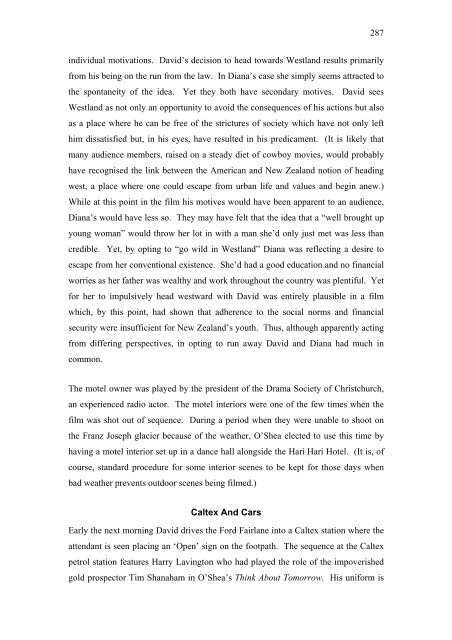Copyright Statement - ResearchSpace@Auckland
Copyright Statement - ResearchSpace@Auckland
Copyright Statement - ResearchSpace@Auckland
Create successful ePaper yourself
Turn your PDF publications into a flip-book with our unique Google optimized e-Paper software.
287<br />
individual motivations. David’s decision to head towards Westland results primarily<br />
from his being on the run from the law. In Diana’s case she simply seems attracted to<br />
the spontaneity of the idea. Yet they both have secondary motives. David sees<br />
Westland as not only an opportunity to avoid the consequences of his actions but also<br />
as a place where he can be free of the strictures of society which have not only left<br />
him dissatisfied but, in his eyes, have resulted in his predicament. (It is likely that<br />
many audience members, raised on a steady diet of cowboy movies, would probably<br />
have recognised the link between the American and New Zealand notion of heading<br />
west, a place where one could escape from urban life and values and begin anew.)<br />
While at this point in the film his motives would have been apparent to an audience,<br />
Diana’s would have less so. They may have felt that the idea that a “well brought up<br />
young woman” would throw her lot in with a man she’d only just met was less than<br />
credible. Yet, by opting to “go wild in Westland” Diana was reflecting a desire to<br />
escape from her conventional existence. She’d had a good education and no financial<br />
worries as her father was wealthy and work throughout the country was plentiful. Yet<br />
for her to impulsively head westward with David was entirely plausible in a film<br />
which, by this point, had shown that adherence to the social norms and financial<br />
security were insufficient for New Zealand’s youth. Thus, although apparently acting<br />
from differing perspectives, in opting to run away David and Diana had much in<br />
common.<br />
The motel owner was played by the president of the Drama Society of Christchurch,<br />
an experienced radio actor. The motel interiors were one of the few times when the<br />
film was shot out of sequence. During a period when they were unable to shoot on<br />
the Franz Joseph glacier because of the weather, O’Shea elected to use this time by<br />
having a motel interior set up in a dance hall alongside the Hari Hari Hotel. (It is, of<br />
course, standard procedure for some interior scenes to be kept for those days when<br />
bad weather prevents outdoor scenes being filmed.)<br />
Caltex And Cars<br />
Early the next morning David drives the Ford Fairlane into a Caltex station where the<br />
attendant is seen placing an ‘Open’ sign on the footpath. The sequence at the Caltex<br />
petrol station features Harry Lavington who had played the role of the impoverished<br />
gold prospector Tim Shanaham in O’Shea’s Think About Tomorrow. His uniform is















